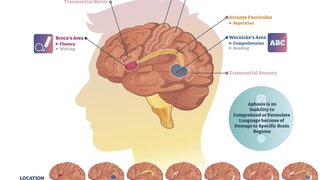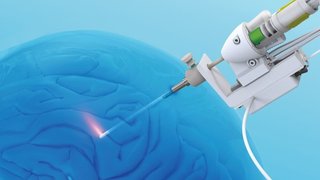Treating functional neurological disorder by retraining the brain and body
July 9, 2025

A few weeks back, I was out on a run, hitting my stride and soaking in the quiet of nature. Suddenly, I looked down and jumped – both feet in the air – convinced I’d seen a snake. A second later, I landed and realized, much to my relief, that it was simply a stick.
My brain didn’t wait for certainty. It used past experience and quick visual input to predict danger – and that prediction became my reality, if only for a moment.
Welcome to the world of predictive processing, where your brain is constantly making best guesses. And sometimes getting it wrong.
A growing body of research shows that to create moment-to-moment perceptions, the human brain weaves together inputs from:
- Past experiences: Things you have observed or experienced, consciously or subconsciously, since infancy.
- Internal sensory cues: Physical symptoms such as sweaty palms, goosebumps, or butterflies in your stomach.
- Context in the surrounding world: What you see, hear, smell, and touch in your environment.
The brain uses this information to predict what happens next, such as the sight of a slithering snake. Each new experience in your life “updates” your brain’s predictions, helping develop more accurate and precise expectations for the future.
When predictions become resistant to new information and are not readily updated, people may develop a potentially disruptive and complex condition called functional neurological disorder (FND).
FND is a common neuropsychiatric disorder that leads to neurological symptoms that are due to disruptions in brain circuits, including those responsible for predictive processing, but are not the result of observable damage to the brain, such as a stroke or multiple sclerosis.
A relatively short time ago, treatment options for FND were limited. But with advances in our understanding of how the brain learns, today’s patients at UT Southwestern’s Peter O’Donnell Jr. Brain Institute Functional Neurological Disorder Multidisciplinary Clinic can access proven treatments to update their predictive processing and begin a journey of recovery.
The brain-mind-body connection
Scientists used to think all human cultures interpreted core emotions such as happiness, sadness, or anger in the same way. Modern science has shown that the opposite is true: The brain (organ) and mind (consciousness) are inseparable, and they construct both our emotions and perceptions under the influence of our bodily sensations – leading to our modern understanding of the embodied mind.
Along with external stimuli, the brain constantly maps internal body cues such as sweaty palms, heart rate, or muscle tension in a process called interoception. All of these combine to influence how our brains learn and predict what’s next.
Functional neurological disorder
FND is the second-most common reason patients visit a neurology clinic, behind headaches. The most conservative measures estimate 265,000 to 480,000 people in the U.S. live with FND; the highest estimates put this number closer to 5 million. Once believed to be caused only by stressful or traumatic life events, FND is now understood as developing for many people in the absence of any clearly identifiable stressor.
Symptoms of FND can appear suddenly and change over time. Examples include but are not limited to:
- Functional/dissociative seizures: Previously named psychogenic nonepileptic seizures, these seizures are not caused by excessive bursts of electrical activity in the brain, unlike with epilepsy.
- Functional movement disorders: Symptoms can include tics, tremors, muscle contractions that cause slowness or posture changes (dystonia), gait and balance problems, and limb weakness or paralysis.
- Functional cognitive disorders: Difficulties with memory and/or other cognitive abilities that are distressing.
Research published in 2023 suggested a need for a new, multidisciplinary diagnosis category called the brain-mind-body interface. This category could represent conditions with physical symptoms that involve psychological processes, such as catastrophizing, dissociation, and high awareness of one’s body cues (somatic hypervigilance).
While more research is needed, being able to reference such a category could one day open the door for more holistic treatments of conditions that cause both physical and psychological symptoms, such as:
- Functional neurological disorder
- Chronic pain disorders
- Disorders of brain-gut interaction
- Persisting symptoms after mild traumatic brain injury
- Fibromyalgia
While FND symptoms can significantly impact quality of life, there are many reasons to have hope for recovery. Specialized treatments can help people update their predictions and gain more agency over their emotional, cognitive, and bodily experiences.
Personalized FND treatment
The UTSW Department of Psychiatry’s Functional Neurological Disorder Multidisciplinary Clinic is one of the growing yet still too-few centers to take a comprehensive approach to managing FND.

Our team of neurologists, psychotherapists, psychiatrists, and rehabilitative therapists collaborate to address the physical, social, and emotional aspects of this condition.
At your first visit, we want to get to know you – not just a rundown of your symptoms and medical history. What brings you joy? What are your strengths? What gives you a sense of purpose and meaning? Who in your life is important to you? Patients often tell us that their initial visit is the first time someone has genuinely listened to their story and believed what they had to share.
Because FND can be complex, there is not a single test to confirm the diagnosis. We take a biological, psychological, and social approach to understand the whole person living with FND.
If you are diagnosed with an FND, your care team will create a treatment plan that may include a combination of therapies such as:
- Psychotherapy, a powerful medication that doesn’t come in a bottle. It can help you recognize your emotions, observe your responses to feelings with compassionate curiosity, label them without judgment, and practice steps to gain more control over what happens next. UTSW also offers a 10-week, evidence-based group therapy program designed specifically for the treatment of FNDs.
- Physical therapy incorporates movement to shift attention away from the symptoms and show your body that healthy movement is possible. Seeing and feeling the symptomatic limb or joint move helps to update the brain’s prediction about that part of the body.
- Medication: Although there is not a medication for FND itself, managing symptoms such as anxiety, depression, headache, pain, and sleep disturbance can help patients feel better as they work through recovery.
Personalized care for functional symptoms
In years past, FND was considered a diagnosis of exclusion. Important progress has been made in making it a diagnosis of inclusion – a distinct and treatable condition based on clinical exam and history findings.
This brain-mind-body connection strongly influences our physical and emotional health, positively and negatively. Feeling a range of emotions and physical sensations is part of the human experience, but disruptions don’t have to control your health. As research draws neurology, psychiatry, and psychology closer together, it is our goal to offer even more advanced options to treat – and potentially prevent – functional neurological disorders.
Meet the UT Southwestern FND care team
Click on each image to meet members of Dr. Chadrick Lane's team at UT Southwestern who treat patients with functional neurological disorder, with words from Dr. Lane about what each brings to the practice.
To talk with an expert about treatment for functional neurological disorders, make an appointment by calling 214-645-8500 or request an appointment online.











